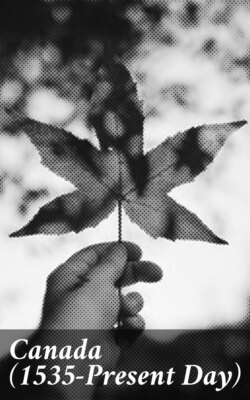Читать книгу Canada (1535-Present Day) - Группа авторов - Страница 5
На сайте Литреса книга снята с продажи.
3. THE FRENCH SETTLEMENT IN THE ISLAND OF ST. CROIX (1604).
ОглавлениеTable of Contents
Source.—Grant and Biggar's edition of Lescarbot's History.
During the above voyage M. de Monts worked away at his fort, which he had placed at the foot of the island, opposite the end on which, as we have said, he had lodged his cannon. This was well thought on, in order to control the whole river both up stream and down. But the trouble was that the said fort faced the north, and was without any shelter, save the trees along the shore of the island, which in the vicinity of the fort he had forbidden to be cut down. And outside the said fort was the barracks for the Swiss, large and spacious, and other small buildings like a suburb. Some had built log-huts on the mainland near the stream. But inside the fort was the dwelling of the said M. de Monts, built of fair sawn timber, with the banner of France overhead. Elsewhere within the fort was the magazine, wherein lay the safety and the life of each, built likewise of fair timber, and covered with shingles. And opposite the magazine were the lodgings and dwellings of MM. d'Orville, Champlain, Champdoré, and other notable persons. Opposite the quarters of the said M. de Monts was a covered gallery, to be used either for sports or by the workmen in wet weather. And the whole space between the said fort and the battery was taken up with gardens, at which every man worked lightheartedly. Thus passed the whole autumn; and it was not bad progress to have built their houses and cleared the island before winter; while in these parts pamphlets were being circulated under the name of Master William, stuffed with all sorts of news, wherein among other things this prognosticator said that M. de Monts was pulling out thorns in Canada. And when all is well considered, it may truly be called pulling out thorns to take in hand such enterprises, full of toils and of continual danger, care, vexation and discomfort. But virtue and the courage which overcomes all such obstacles make these thorns to be but gilly-flowers and roses to those who set themselves to these heroic deeds in order to win glory in the memory of men, closing their eyes to the pleasures of those weaklings who are good for nothing but to stay at home.
Having done the things of greatest urgency, and grey-bearded father Winter being come, they needs must keep indoors, and live every man under his own roof-tree. During this time our friends had three special discomforts in this island, to wit, want of wood (for that on the said island had been used for the buildings), want of fresh water, and the night watch for fear of a surprise from the Indians who were encamped at the foot of the said island, or from some other enemy; for such is the evil disposition and fury of many Christians, that one must be more on one's guard against them than against the infidel. This it grieveth me to say; would indeed that I were a liar herein, and that I had no cause to speak it. Thus when water or wood was required they were constrained to cross the river, which on either side is more than three times as broad as the Seine at Paris. This was both painful and tedious; so that very often one had to bespeak the boat a day in advance before being able to get the use of it. On top of this came cold and snow and frost so hard that the cider froze in the casks, and each man was given his portion by weight. As for wine, it was only given out on certain days of the week. Some lazy fellows drank melted snow without troubling to cross the river. In short, unknown diseases broke out, like those which Captain Jacques Cartier has already described for us, of which for fear of vain repetition I shall therefore not give an account. No remedy could be found.
